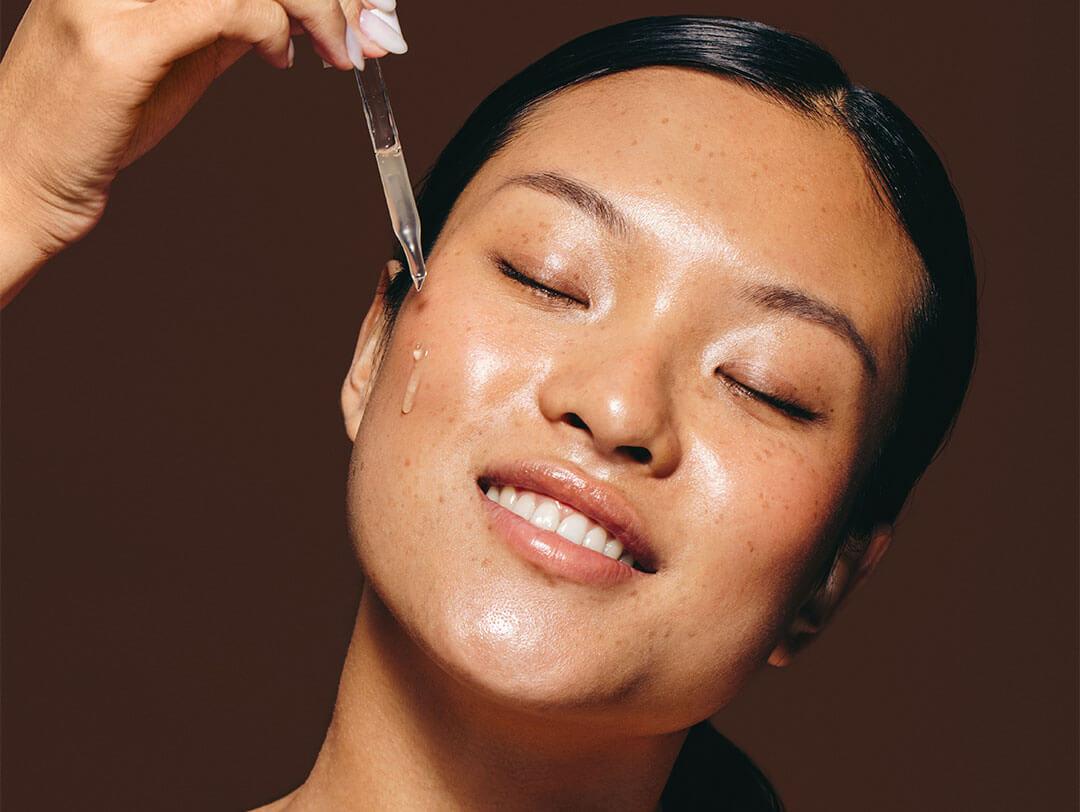Want Your Face Serum to Actually Work? Here’s How to Apply It Most Effectively



Dahvi Shira


You’ve seen it all over TikTok, you saved your hard-earned bucks, you finally own the serum everyone’s talking about—but… you don’t know how to use it. With so many different ingredients, consistencies, and coloring, serums can confuse even the most knowledgeable of skincare enthusiasts. Some serums are designed for specific times of day, while others don’t pair well with particular ingredients.
“Serums are easy to incorporate into your daily routine, and you can easily swap them out to address varying skin concerns,” says dermatologist Corey L. Hartman, MD. “The molecule size of active ingredients in serums tend to be smaller than the same ingredient found in a moisturizer, which enables the serum to be absorbed deeper into the surface of the skin, where it can be most effective. You’ll find serums to address hyperpigmentation and even skin tone, reduce fine lines and wrinkles, and much more.”
Vitamin C serum, hyaluronic acid serum, retinol, peptides, niacinamide, collagen, and salicylic acid are just a few terms you’ll often hear in the serum-sphere. Understanding these nourishing ingredients that make up an array of formulations can feel like a lot to take in—so if you’re perplexed, you’re not alone. Because it can come off quite complicated, we turned to the experts to break things down. Keep reading for everything you need to know about how to use face serum, and how to combat everything from dry skin, to breakouts, to signs of aging, and then some.


It's about glam time you treated yourself.
MEET THE EXPERT
Corey L. Hartman, MD, is a board-certified dermatologist and the founder of Skin Wellness Dermatology in Birmingham, AL.
Christina Uzzardi is the founder of Cheeks + Co facial and waxing spa and its in-house skincare brand called TIDALSHIFT.
How to Use Face Serum
1. Use It In Beginning of Your Skincare Routine
The general rule of thumb when it comes to skincare application order is thinnest to thickest. But of course use cleanser before applying anything. If it’s in the morning, we recommend something gentle. At nighttime, depending on how much you have on your face from the whole day, you may need an oil-based cleanser followed by a gel or foam-based cleanser. Then comes the rest.
“If you use a toner or essence, use that first,” advises Dr. Hartman, fresh from cleansing. “If you don’t use one of those products, you’d apply serum to the face first before applying anything else.”
To kick off any routine, we love the three-in-one GLOW RECIPE Blueberry Bounce Gentle Cleanser, as it knocks out all our necessary prep steps in one go. Oh, and it smells quite lovely, too.
If you don’t actually own a serum yet, but you want something universally praised for all skin types and experience, you can’t go wrong with the non-comedogenic CAUDALIE Vinoperfect Radiance Serum. This trusty cult classic targets hyperpigmentation and moisture, and leaves our skin feeling plump, refreshed, and fresh from the spa.
2. Follow Application Instructions on Label
Unlike with many moisturizers, serum application typically follows a less-is-more protocol. We’ve experienced pilling because when the consistency feels so thin, it’s easy to get apply-happy. But ultimately you’ll want the label to be your guide. Chances are, even if it feels like you’re not doing much, you really are. Two to three drops max per serum, says spa founder Christina Uzzardi. You’ll also want to be mindful of what’s recommended for a.m. use vs. p.m. use. Again, everything you need to know should be listed for you on the label, so don’t worry about a thing.
3. Apply It With Your Hands
No fancy frills needed here! Once you have your advised amount set aside with the serum’s dropper, apply that amount to your face with your hands. “Pat it in for a few seconds at a time until you cover the entire area you’re targeting with the serum,” says Uzzardi. “Some serums are all-over serums, and some you only want to use on a highly pigmented area, or maybe a dry patch that’s driving you crazy.”
4. Give the Serum Time To Set Into the Skin
Whether you’re rushed, impatient, or you’re in a more-the-merrier mood, it’s easy to slather on serums like they’re going out of business. That said, you’ll want to take things slow. We personally kick off our skincare routine right after we get out of bed in the morning. We give our initial product time to kick in while we make coffee or tend to other needs. Then we apply something else and check our email. It’s definitely not a rushed process.
“I recommend allowing a serum to sit on the skin for a few minutes before applying your next skincare product,” says Dr. Hartman. “This gives serum time to be absorbed into the deeper layers of the skin.”
If you want to layer multiple serums in one routine, we recommend the FIRST AID BEAUTY Hydrating Serum with Hyaluronic Acid as one of your products. This lightweight humectant is known to layer beautifully with other products. And on the other side of things, if you want a one-and-done serum that includes multiple benefits with just a single application, we stand by Dr. Hartman’s pick, the award-winning MOTHER SCIENCE Molecular Hero Serum. It uses the powerful antioxidant Malassezin to target hyperpigmentation, fine lines, and wrinkles.
Above all else, you’ll never want to use too many serums in one session (whether you give them time to settle or not). Some serums can counteract each other’s benefits, while others may contain active ingredients that can overpower the skin if used too much. If you’re new here, a good rule of thumb is to start slow.
5. Follow With Use of Moisturizer and Sunscreen
Once your serum application is complete, your work isn’t done. It’s from here that you may want to apply moisturizer, then face oil, then SPF (while still waiting in between steps). While your serums will still be effective without them, moisturizers and oils help lock everything in and keep the skin hydrated, while SPF is an absolute must to shield your skin from the sun’s harmful rays. Basically, you can’t go wrong with any of these.
The only thing we’ll say is if you have acne-prone skin, speak to your doctor before using face oils, as you don’t want to clog the pores. We recommend the CLARA'S NEW YORK Moisturizing Rosehip Facial Oil as a universal starter because rosehip oil is known to be non-comedogenic.
Want in on all the IPSY skincare fun and more? Take our Beauty Quiz now to get started with your own IPSY beauty subscription. Already an IPSY member? Refer your friends to earn points, which you can use toward products. Either way, don’t forget to check us out on Instagram and TikTok @IPSY.
Like this article? Share it with your friends by clicking the icons below!
Liked this post? Share!
Related Stories


Skin
How to Adjust Your Skincare Routine for Mature Skin in the Winter
Published on Dec 4, 2025 • 7 min read


Skin
Meet the Best Moisturizers for Winter, According to Dermatologists
Published on Dec 1, 2025 • 9 min read


Skin
What Is Inflammaging—and Why Everyone’s Talking About It
Published on Dec 1, 2025 • 8 min read


Skin
6 Skincare Trends to Have on Your Radar in 2026, According to Experts
Published on Dec 1, 2025 • 7 min read


Skin
We Grabbed Our Crystal Ball and Found These 6 Skincare Predictions for 2025
Published on Dec 10, 2024 • 7 min read


Skin
Simple Self-Care Tips That Actually Make a Difference
Published on Nov 13, 2025 • 12 min read


Skin
These 9 Face Scrubs Will Unlock Soft and Smooth Skin on Contact
Published on Nov 5, 2025 • 10 min read


Skin
10 Thanksgiving Foods That Will Have Your Skin Coming Back for Seconds
Published on Oct 15, 2025 • 7 min read


Beauty Picked Just for You
Get 5 products worth up to $70
Plus exclusive access to epic deals up to 80% off
Starting at just $14/month. Cancel anytime.